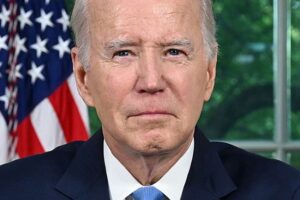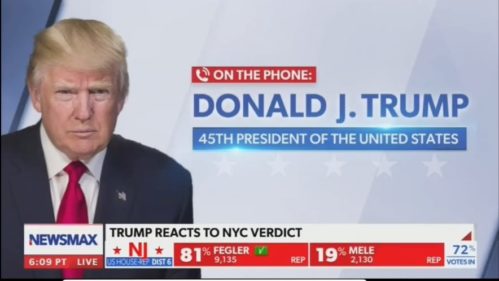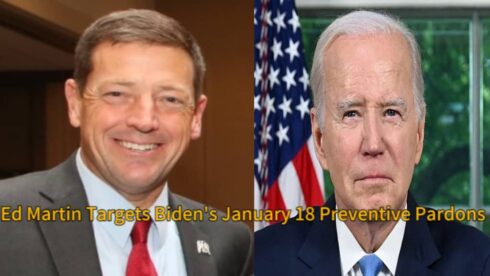Trump Vows Retribution Once Again | OGM News– In the wake of his recent guilty verdict in New York City, former President Donald Trump is once again making headlines with his controversial statements. During an interview with the far-right network Newsmax, Trump vehemently claimed that he did not receive a fair trial, going as far as to say, “Mother Teresa couldn’t get a fair trial here.” His complaints extended to the jury’s demeanor, stating, “I never saw a glimmer of a smile from the jury,” suggesting their lack of warmth as evidence of bias.
Trump’s allegations of unfairness have raised eyebrows among legal experts and political commentators. He asserted that the trial was universally denounced, even by his opponents: “It was a trial that everybody said shouldn’t have been brought, including bragged didn’t want to bring it.” However, this claim contradicts the fact that the trial proceeded, indicating sufficient legal grounds for its continuation. Trump’s argument that the trial only occurred because he decided to run for office and was “beating everybody by a lot” in the polls, particularly Biden, suggests he sees the legal process as politically motivated.
Threats of Retribution: Jailing Political Opponents
In a startling turn, Trump has begun openly discussing the possibility of using presidential power to jail his political adversaries if he wins re-election. His threats specifically target former Secretary of State Hillary Clinton, who had no involvement in his New York City trial. Trump’s words during the Newsmax interview were chilling: “Wouldn’t it be terrible to throw the president’s wife? And the former Secretary of State… Into jail wouldn’t that be a terrible thing, but they want to do it.”
This rhetoric is not new for Trump, who has a history of promising retribution against his perceived enemies. His suggestion that jailing political opponents could become the norm is particularly alarming: “Does that mean the next president does it to them? That’s really the question.” This statement implies a dangerous precedent where political power is used to settle personal scores, challenging the very foundations of democratic norms and the rule of law in the United States.
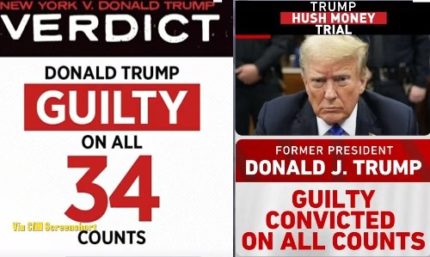
The Impact of Trump’s Threats of Retribution on Democratic Norms and Future Elections
Trump’s post-verdict comments have sparked concerns about the long-term impact on American democracy. His statement, “It’s a terrible precedent for our country,” ironically refers to his own trial, but many argue that his threats of retaliation are the real threat to democratic principles. The idea that a president could use their power to imprison political rivals is seen by many as a hallmark of authoritarian regimes, not stable democracies.
Furthermore, Trump’s warnings that “it’s very possible that it’s going to have to happen to them” suggest he views retribution not just as a possibility, but as a necessity. This stance could significantly influence the 2024 presidential election, making it less about policy issues and more about the potential for political vendettas. It raises questions about whether voters will see this as a dangerous shift away from established norms or as a justified response to perceived persecution. As the election approaches, Trump’s rhetoric may well test the resilience of America’s democratic institutions and the public’s commitment to the peaceful transition of power.
Trump Supporters Flood Pro-Trump Websites with Violent Rhetoric
In the aftermath of Donald Trump’s historic conviction on 34 felony counts by a New York jury, a troubling pattern has emerged. According to a Reuters report from May 31st, enraged supporters of the former president have inundated pro-Trump websites with alarming calls for violence, revolution, and retribution. The investigation reviewed comments on three Trump-aligned platforms: his own Truth Social, Patriots.Win, and Gateway Pundit, revealing dozens of posts that advocate for extreme actions.
The tone and content of these posts are deeply concerning. Some supporters have called for direct attacks on jurors, while others have gone as far as demanding the execution of Justice Juan Merchan, who presided over Trump’s trial. One chilling comment on Patriots.Win reads, “Someone in NY with nothing to lose needs to take care of Merchan,” followed by a disturbing suggestion: “Hopefully he gets met with illegals with a machete.” This rhetoric not only targets a federal judge but also exploits xenophobic fears about illegal immigrants.
Threats of Retribution From Online to Real-World Violence: The January 6th Parallel
The current surge in violent online discourse bears a striking resemblance to the period following the 2020 presidential election. Then, as now, Trump’s inflammatory statements about a “stolen election” heated up the political atmosphere, culminating in the January 6th, 2021 riot. That day, enraged supporters, fueled by baseless claims of election fraud, attempted to overtake the U.S. government in an insurrection-style attack, leaving an indelible scar on American democracy.
Today’s online threats show a similar pattern of escalation. On Gateway Pundit, one poster suggested a chilling response to the verdict: “Time to start capping some lefties,” adding ominously, “This cannot be fixed by voting.” Such statements reject peaceful, democratic processes in favor of violence. This parallel to the pre-January 6th period is not lost on observers, who fear that unchecked online vitriol could once again translate into real-world violence, particularly as the 2024 election approaches.
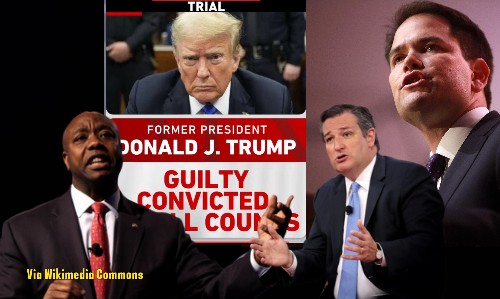
Trump’s Threats of Retribution and Republican Leadership’s Responsibility
Despite the rising tide of violent rhetoric among his supporters, Donald Trump has shown no inclination to calm the storm. His silence in the face of these threats is reminiscent of his behavior before and during the January 6th riot, where he was accused of inciting violence through his words and inaction. This pattern raises critical questions about the responsibility of political leaders to moderate their supporters’ actions, especially when those actions threaten the fabric of democratic society.
The situation puts Republican leaders in a particularly challenging position. Many have a history of condoning or downplaying Trump’s provocative statements, viewing them as part of his unconventional political style. However, with calls for violence escalating in the wake of Trump’s conviction, their response—or lack thereof—could have far-reaching consequences. Experts argue that by not unequivocally condemning these threats, Republican leaders risk normalizing extremist behavior within their party. As the nation moves closer to another presidential election, their stance on this issue may well define the party’s relationship with the rule of law and democratic norms for years to come.




